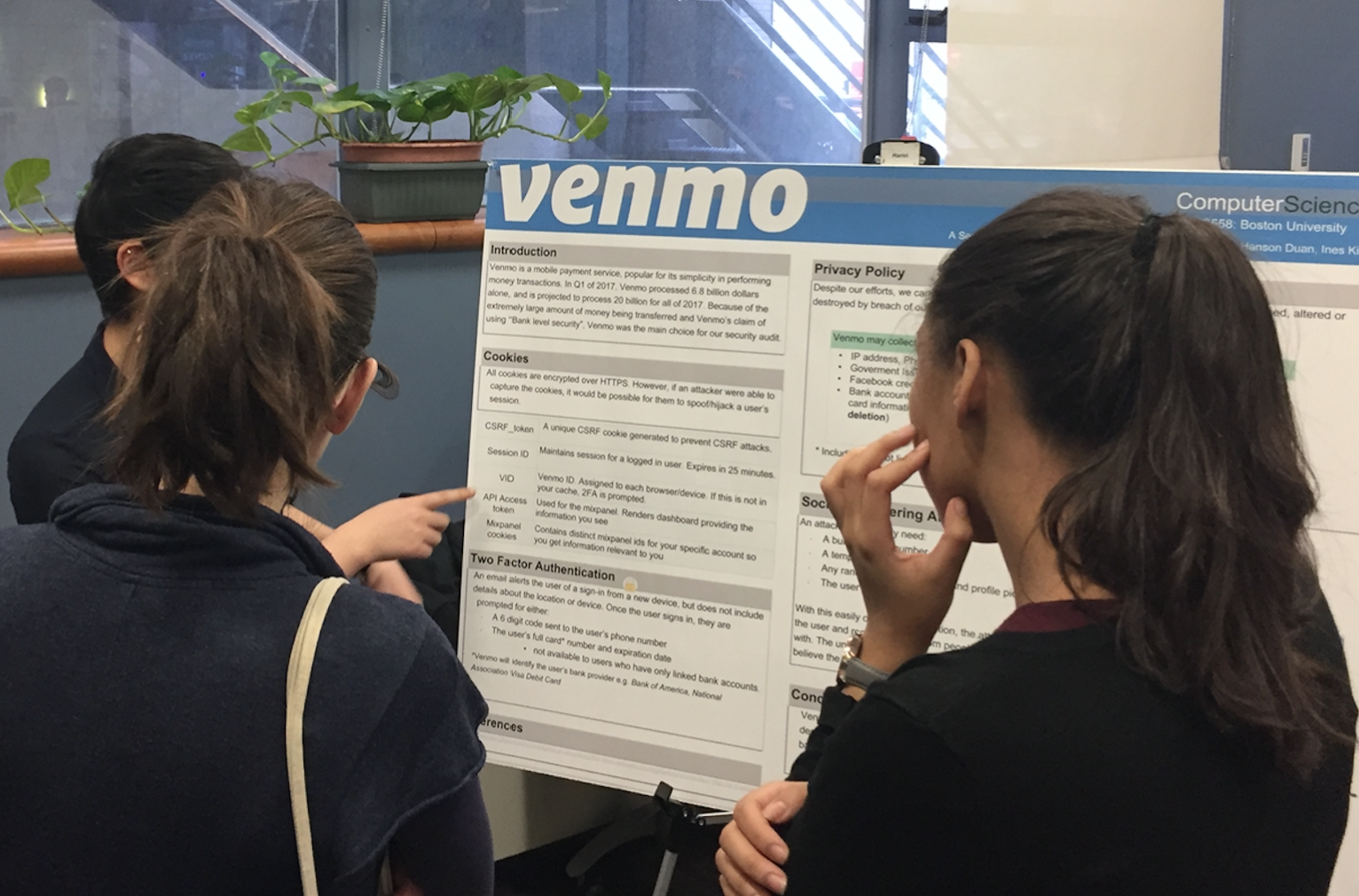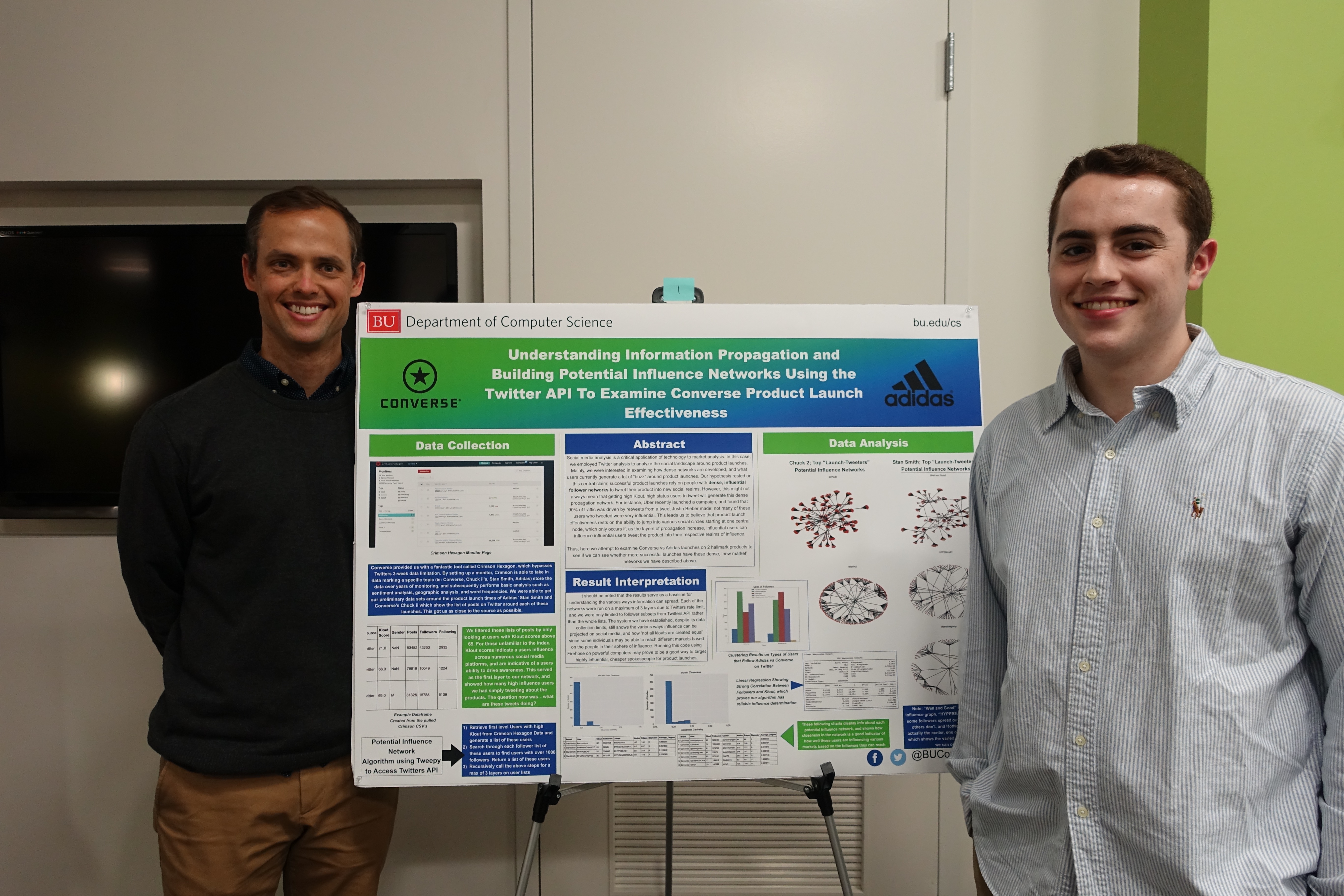Over 200 Students Present Work to Peers, Faculty & Industry
[Return to Nexus Newsletter]
By Sabrina Charania
As part of its commitment to enriching the student research experience at BU, the Hariri Institute for Computing supports several computer science (CS) courses that provide experiential learning opportunities to students. These opportunities give students a chance to exchange ideas with industry leaders and allow them to explore how computational perspectives can play into both their education and career paths. At the culmination of course work, the Institute hosts public poster sessions that give students the opportunity to showcase their work amongst peers, faculty, and external partners; this past spring the Institute was pleased to host poster sessions for three computer science courses, Data Mechanics (CS 591), Network Security (CS 558), and Tools for Data Science (CS 506).
A component of the Smart-city Cloud-based Open Platform and Ecosystem (SCOPE) project, Andrei Lapets, CS Adjunct Assistant Professor and Director for Research Development and SAIL at the Hariri Institute for Computing taught the popular Data Mechanics course this past spring. Over 50 students worked in teams to complete 25 projects in which they worked with real data sets from a variety of sources to build applications and services that perform analysis and solve real-life optimization problems. Students presented posters that answered questions ranging from how to find the best area to live to what steps to take regarding rising sea levels.
Undergraduate students Minteng Xie, Yue Lei and Zhi Dou used the project as an opportunity to find a solution to quantifying the best living areas in Boston. The algorithm they created takes into account individual preferences and averages variables such as rent costs, transportation accessibility and local food establishments to allow users to find living areas best suited for them. The system even takes into account crime records and provides users with a list of 5 neighborhood recommendations. The City’s open data platform, alongside generous contributions by the Massachusetts Department of Transportation and Boston Public Schools, gave students the access to basic data that allowed them to develop their projects.
Led by Hariri Institute Fellow and Computer Science Associate Professor Sharon Goldberg, the Hariri Institute also hosted a poster session for nearly 100 students enrolled in the Network Security course. Throughout the semester, professor Goldberg gave undergraduate seniors, masters, and PhD students the chance to push the boundaries of applied cryptography and web and network protocol security by assessing a variety of companies and providing evaluations of their online security protocols. Students reviewed how sites such as eBay, Pinterest, Reddit, AT&T and Groupon use encryption, track visitors through cookies, and keep user information secure.
 One group, made up of Benny Guan, Jeraldine Guerrero, Hanson Duan and Ines Kim, explored the popular money exchange app Venmo. The team was able to verify the security of user information as well as funds within the system. The group, however, identified potential functionality and transaction guarantee issues due to gap in time between Venmo’s request to a user’s bank and when funds are deposited into the user’s Venmo account; they also noted the opportunity for identity mimicking, which could result in potential fraudulent charges. Some students even found vulnerabilities in the sites they studied and worked responsibly with Professor Goldberg to reach out to the affected companies and notify them of the discovered risks.
One group, made up of Benny Guan, Jeraldine Guerrero, Hanson Duan and Ines Kim, explored the popular money exchange app Venmo. The team was able to verify the security of user information as well as funds within the system. The group, however, identified potential functionality and transaction guarantee issues due to gap in time between Venmo’s request to a user’s bank and when funds are deposited into the user’s Venmo account; they also noted the opportunity for identity mimicking, which could result in potential fraudulent charges. Some students even found vulnerabilities in the sites they studied and worked responsibly with Professor Goldberg to reach out to the affected companies and notify them of the discovered risks.
The final student poster session hosted this past spring featured work of students in the Tools for Data Science course, taught by Professor Evimaria Terzi, Associate Professor of Computer Science. BU Spark!, a new initiative at the Institute, worked to source real-world projects for the course, creating direct linkages between student teams and industry mentors. The course covers practical skills in working with data and introduces a wide range of techniques that are commonly used in the analysis of data, such as clustering, classification, regression, and network analysis. Since the course emphasizes hands-on application of methods, these real-world projects are crucial to achieving learning objectives.
 One student team included undergraduate student Josh Surette and graduate student Brian Hart who worked with Converse and Adidas. The duo analyzed how successful sneaker launches were influenced by advertising strategies on Twitter. Surette considers says he considers it “the coolest learning experience [he’s] ever had” and even got the chance to present the results to Converse’s strategy team with his partner, Hart. Through this experiential learning opportunity, students were able to use lessons from the classroom to take on real-world challenges and gain exposure to potential future employers.
One student team included undergraduate student Josh Surette and graduate student Brian Hart who worked with Converse and Adidas. The duo analyzed how successful sneaker launches were influenced by advertising strategies on Twitter. Surette considers says he considers it “the coolest learning experience [he’s] ever had” and even got the chance to present the results to Converse’s strategy team with his partner, Hart. Through this experiential learning opportunity, students were able to use lessons from the classroom to take on real-world challenges and gain exposure to potential future employers.
The student poster presentation sessions are a fantastic opportunity for students to demonstrate their learning and showcase the professional skills these courses are helping to develop. Experiential opportunities give students a chance to explore problems and data beyond the classroom and apply their abilities to real-world problems and create computational solutions that bring their ideas to life.
